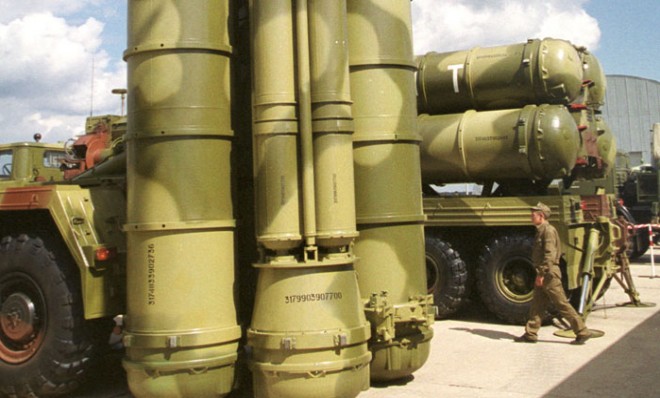How Russian missiles may ruin Syrian peace hopes
Israel and the U.S. are awfully angry over Bashar al-Assad's claim to have received Russian anti-aircraft missiles

A free daily email with the biggest news stories of the day – and the best features from TheWeek.com
You are now subscribed
Your newsletter sign-up was successful
This was not the announcement the United States, Israel, or the Syrian rebels wanted to hear.
"Syria has received the first shipment of Russian antiaircraft S-300 rockets," Syrian President President Bashar al-Assad said Thursday on Al Manar, the television channel run by Hezbollah. "The rest of the shipment will arrive later today."
This was unwelcome news, though not entirely unexpected. Russia has been Syria's main arms supplier throughout the conflict, and the missile shipment was announced earlier this week by Russian officials.
The Week
Escape your echo chamber. Get the facts behind the news, plus analysis from multiple perspectives.

Sign up for The Week's Free Newsletters
From our morning news briefing to a weekly Good News Newsletter, get the best of The Week delivered directly to your inbox.
From our morning news briefing to a weekly Good News Newsletter, get the best of The Week delivered directly to your inbox.
The fact that Assad claims to have the S-300 rockets, however, does signal that the conflict probably won't end any time soon.
What is so bad about S-300 rockets?
Israel is the country most concerned about this development. With a range of 125 to 185 miles, the missiles could be used to hit targets in Israel, strike Israeli civilian or military aircraft, or be sold to Hezbollah.
Shlomo Brom, a senior Israeli security official, told The Guardian that military action was an option if the missiles were delivered:
A free daily email with the biggest news stories of the day – and the best features from TheWeek.com
It's difficult to know when and where this breaking point will be but the likelihood of a very real flare up between Israel and Syria is much higher than it used to be. The Russian delivery of missiles to Assad are intended more as a threat to the west than to Israel. But to some extent, we are the victims [of that aggression]. [The Guardian]
Israel has already launched several pre-emptive attacks against Syria, most notably an airstrike at the Jamraya military facility meant to prevent missiles from falling into the hands of Syria ally Hezbollah.
Why did Russia send these missiles?
Russia, a longtime ally of the Assad regime, knew the missile shipments were going to upset Israel and the United States, yet it sent them anyway. Some are blaming the expiration of the E.U. weapons ban on Friday, which will allow countries such as France and Britain to supply arms to the Syrian rebels. One high-ranking Israeli official explained this train of logic to The Guardian:
This move will certainly change the whole dynamic [of Israeli involvement in the Syrian conflict]. This is mostly as a result of the EU's reckless decision to lift the arms embargo. I don't know if the shipment of the missiles was a direct result of that decision, but it certainly gave the Russians a pretext to go ahead and do what they wanted to do in the first place. If they had any misgivings, doubts about the timing, the EU decision rid them of these. [The Guardian]
David Blair, chief foreign correspondent at The Telegraph, disagrees, arguing that Russia had a contract to ship the missiles to Syria long ago and "in all probability, this sale would have happened anyway."
What does that mean for chances of peace?
It jeopardizes the U.S.-Syria sponsored peace talks that are supposed to take place on June 5 in Geneva.
The Syrian National Coalition, the most prominent Western-backed opposition group, has already backed out them, according to the Associated Press, saying that the "international conference on a political solution to the situation in Syria has no meaning in light of the massacres that are taking place."
It also complicates the relationship between Russia and the United States. State Department spokesman Patrick Ventrell said that White House officials "disagree and condemn the continued supply of Russian weapons to the regime." Recent tensions over spies, intelligence-sharing after the Boston Marathon bombing, and more aren't making things any easier between Russia and the U.S.
As Anthony Cordesman, a former Pentagon official, told Reuters: "You have a level of division between Russia and the U.S. before you even start these talks that makes it even harder to bring the parties together."
Keith Wagstaff is a staff writer at TheWeek.com covering politics and current events. He has previously written for such publications as TIME, Details, VICE, and the Village Voice.
-
 The broken water companies failing England and Wales
The broken water companies failing England and WalesExplainer With rising bills, deteriorating river health and a lack of investment, regulators face an uphill battle to stabilise the industry
-
 A thrilling foodie city in northern Japan
A thrilling foodie city in northern JapanThe Week Recommends The food scene here is ‘unspoilt’ and ‘fun’
-
 Are AI bots conspiring against us?
Are AI bots conspiring against us?Talking Point Moltbook, the AI social network where humans are banned, may be the tip of the iceberg